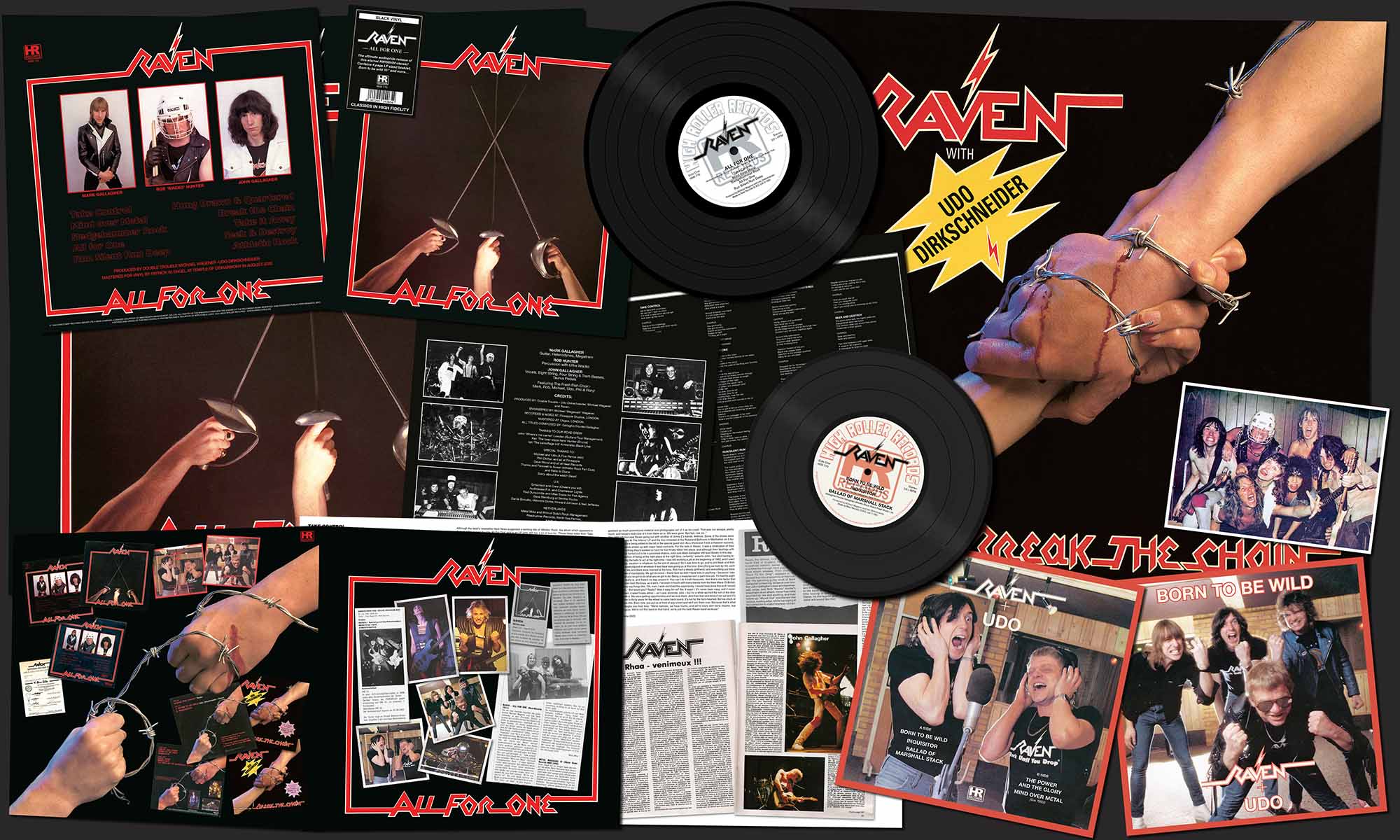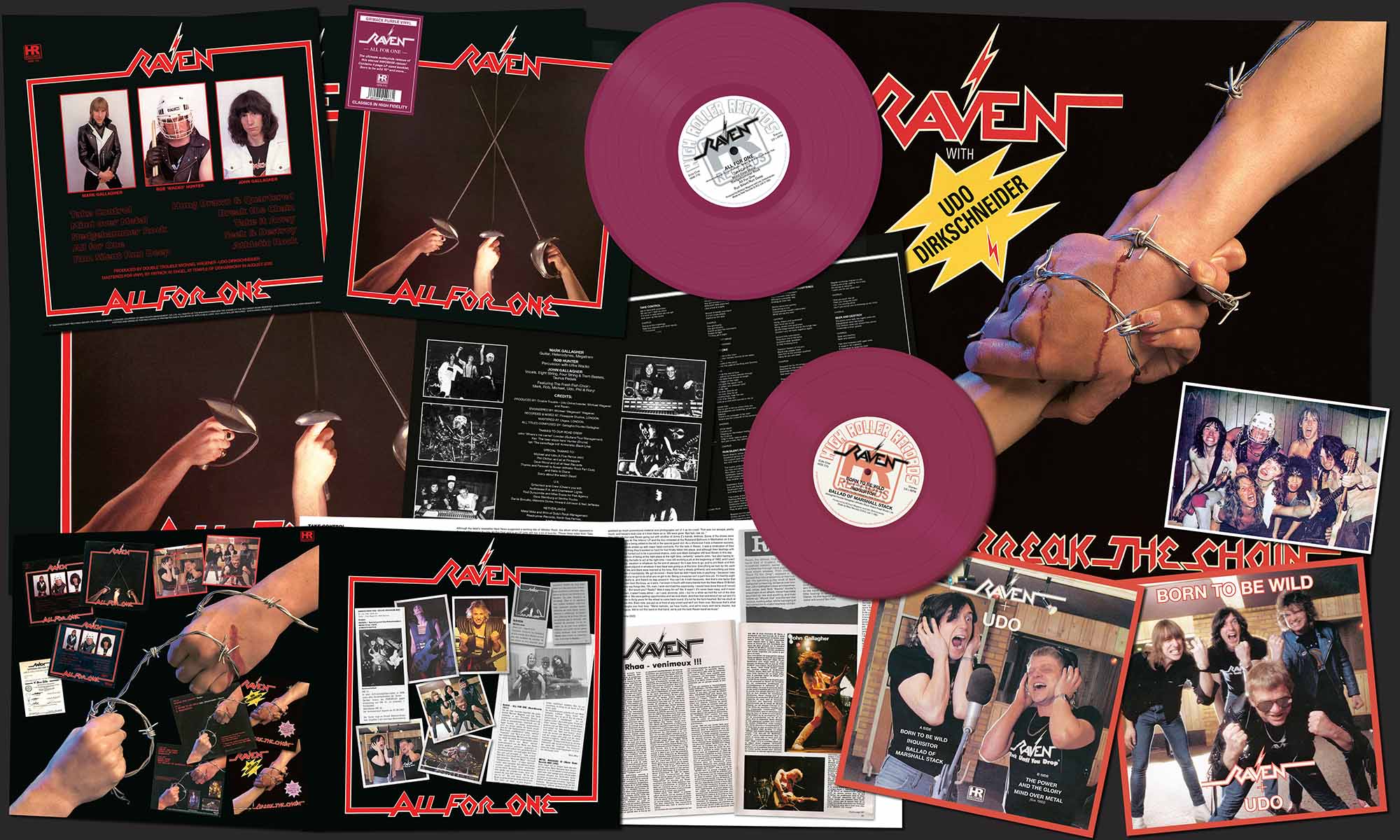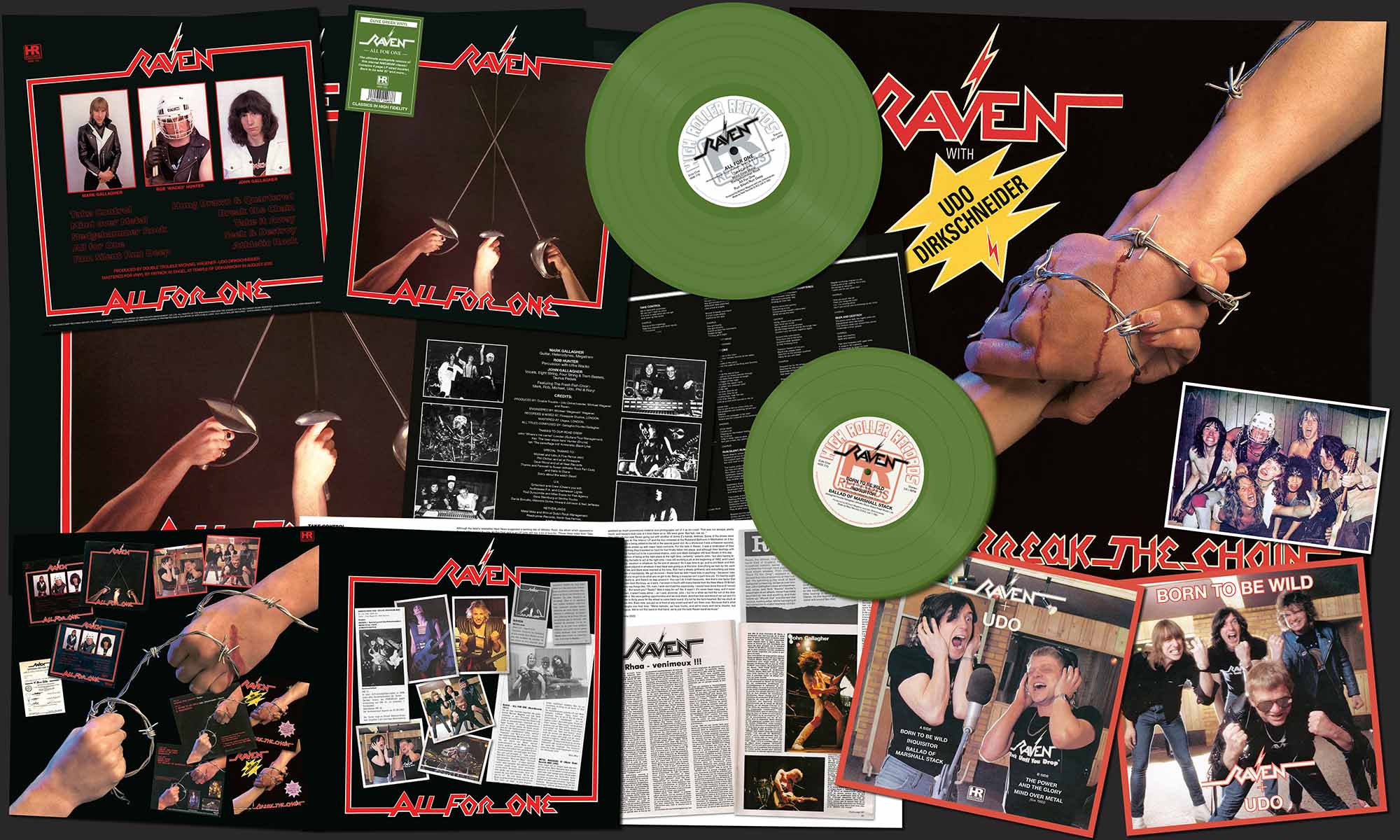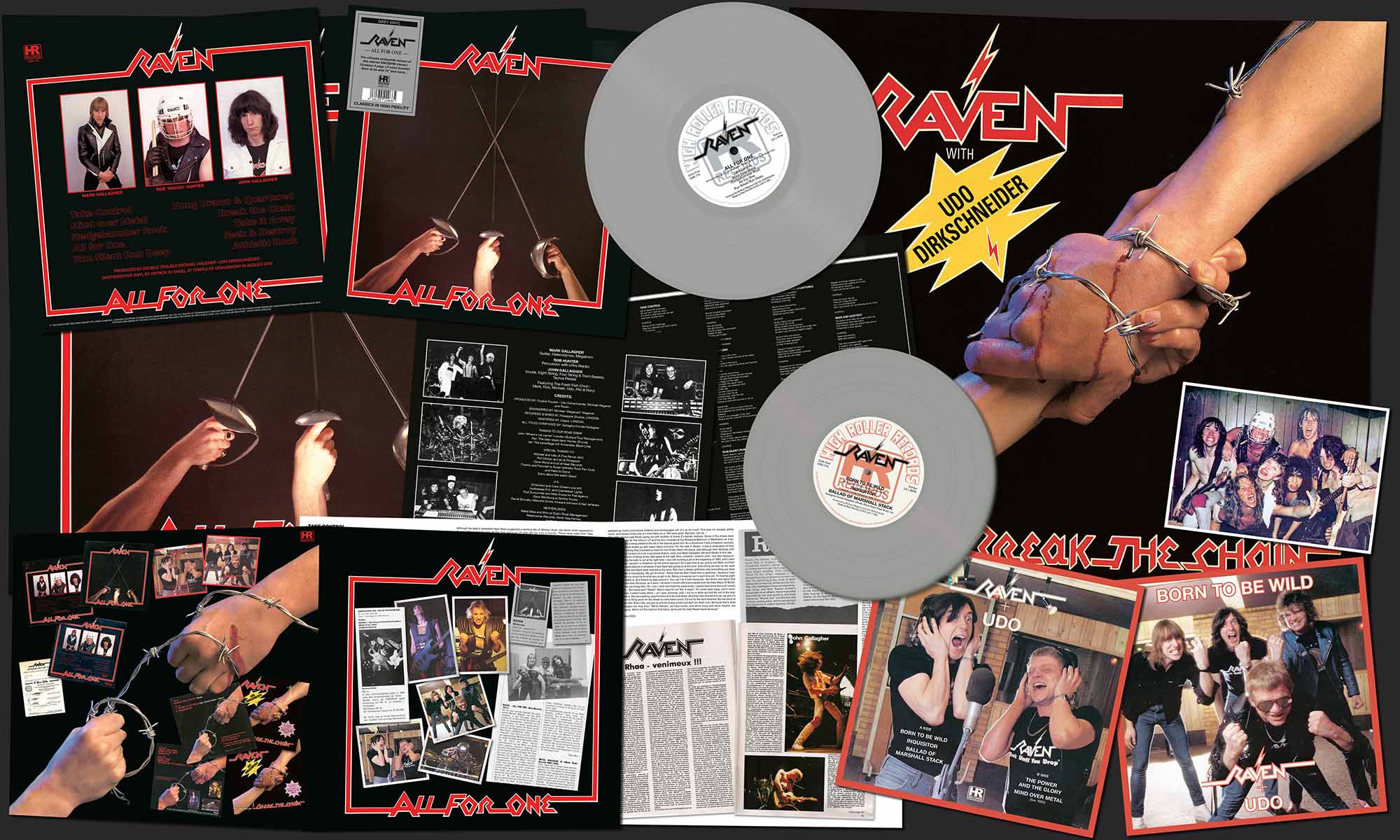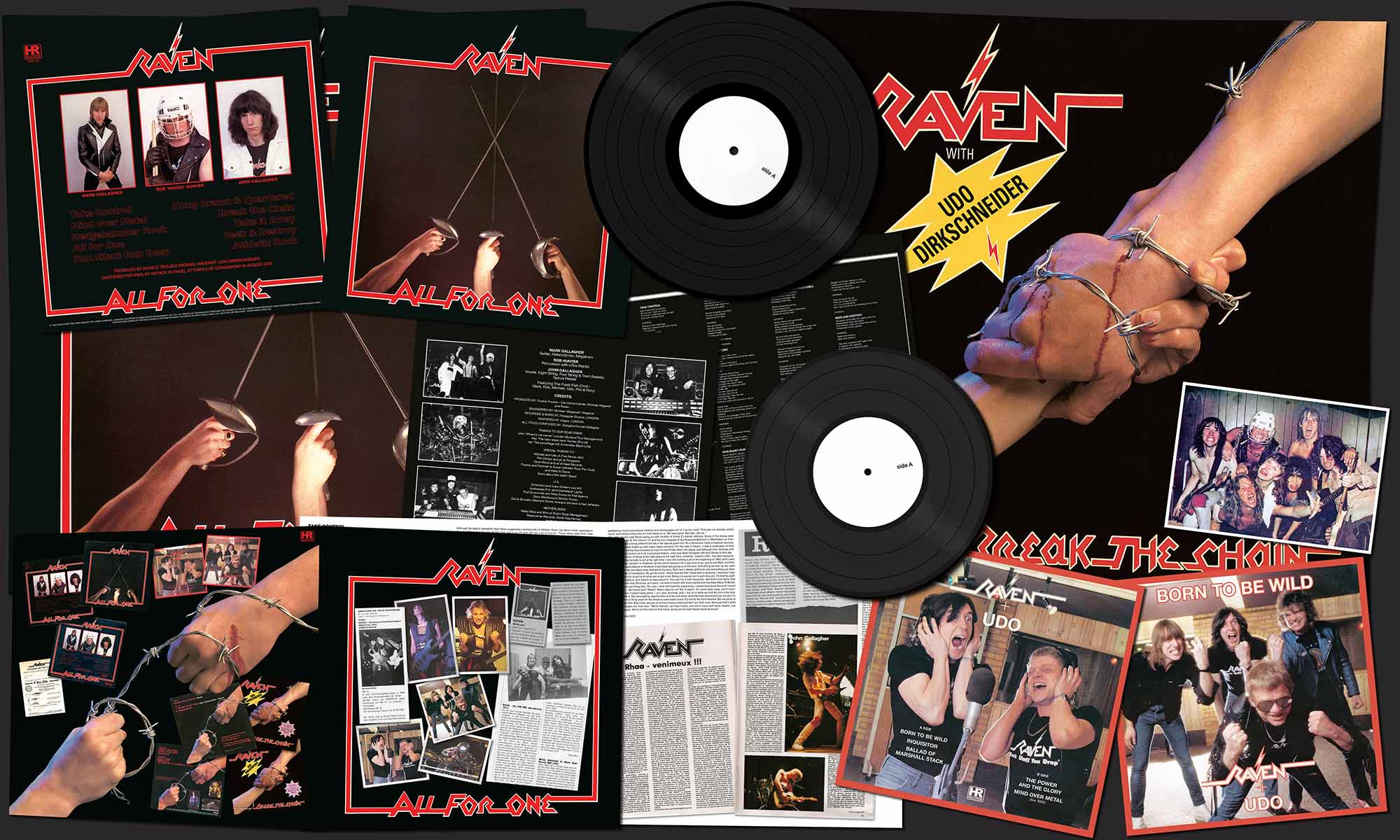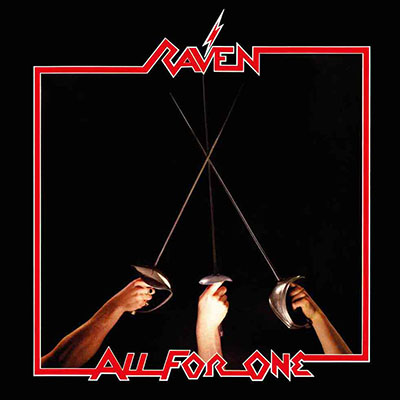 | ||||
| RAVEN - All for One LP+10 | |
HRR 770LP, ltd 1000, 300 x black, 350 x purple, 250 x olive green + 100 x grey vinyl (HRR mailorder exclusive), 425gsm heavy cardboard cover with 5 mm spine, poster, lyric sheet, insert, bonus 10" with p/s | |
| John Gallagher - Bass, Vocals Mark Gallagher - Guitars, Vocals (backing) Rob "Wacko" Hunter - Drums, Vocals (backing) | |
| 01 Take Control 02 Mind Over Metal 03 Sledgehammer Rock 04 All for One 05 Run Silent Run Deep 06 Hung Drawn and Quartered 07 Break The Chain 08 Take it Away 09 Seek and Destroy 10 Athletic Rock | 11 Born to Be Wild 12 Inquisitor 13 Ballad of Marshall Stack 14 The Power and the Glory 15 Mind Over Metal (Live 1983) |
AVAILABLE | |
Original transfer, audio restoration and mastering by Patrick W. Engel at TEMPLE OF DISHARMONY in June 2020. Mastered from an unreleased Megaforce sterling cutting. Best sounding version ever! Cutting by SST Germany on Neumann machines for optimal quality on all levels... The ultimate audiophile edition of this eternal NWOBHM classic!
TAKE CONTROL
Having gained invaluable experience with their string of dates in the States set up by Megaforce Records boss Jon Zazula in October and November 1982, and with two albums and a handful of singles under their belts, when the time came to begin work on Album Number Three bassist/vocalist John Gallagher, his guitarist brother Mark and drummer Rob Hunter decided that things would have to change. In particular, the next LP would not be recorded at Neat Records’ Impulse Studios, nor would the label’s in-house producer sit behind the board. The catalyst for this decision came in January 1982, when the band had been invited to London to record a session for BBC Radio’s The Friday Rock Show on the back of the success of their first album ‘Rock Until You Drop’. “We were in Maida Vale studios doing the BBC session – this was before we did ‘Wiped Out’ – and it was such a wonderful studio. And then we had to go back to that dump? Well, we knew we had to go back and do ‘Wiped Out’ there, but then it was like, ‘That’s it, we’re not doing it here again. Ever.’
“Besides,” he continues, “we’d decided that we were going to do something different. We weren’t going to do a faster album than ‘Wiped Out’ but instead we were going to slow some of the songs down, do different things, play bigger and not quite as busy, as when you’re playing bigger places the sound works a little better if you’re doing stuff that’s a little more deliberate. We weren’t going to turn into AC/DC but we took the temperature here, there and everywhere and thought, ‘OK, well, we’re not going to play at 100mph on every song. We’ll mix it up a bit, and we want a real producer and we want a real studio,’ because we were at least savvy enough to realise that we didn’t know it all and that we needed somebody who knows more than us to get us to where we’re going.”
One of the albums the band collectively really liked was Accept’s 1982 release ‘Breaker’. “So we wanted the guy who did that. David Wood [the owner of Neat Records"> got in touch, and it turned out that the producer didn’t do anything. It was a guy called Michael Wagener, the engineer, who was the guy who did all the work. ‘OK.’ And Woodsy then told us he was working in a production company with Udo Dirkschneider – Accept’s singer – because they were kind of on the outs at the moment. ‘OK,’ we said. ‘So, hire them! What about the studio?’ Neat got the studio sorted, Pineapple Studios in Southall, just outside London, but first of all Michael and Udo came up to Newcastle and we met at Ronnie’s Drum Shop on Shields Road, outside the centre of Newcastle, and worked in the basement for a week doing pre-production. Wow! Pre-production! With a producer!” he laughs. “This was a whole new ball game! I mean, our pre-production before was self-inflicted: we’d record songs ourselves, listen back and change them around and re-record them and ‘OK, here we go, let’s do it’!
“We actually demoed five or six songs at Neat – we had no intention of doing the album there, but decided we wanted to demo them – and the in-house producer, Keith Nichol, who’d done ‘Wiped Out’, was all, ‘Oh, you guys, listen to this, you’re turning into a parody of yourselves...’ ‘Shut the fuck up, Keith, will you!’” Another laugh. “I’ve actually heard the demos recently and they’re not bad actually, they’re maybe 85% of what they were supposed to be. But Michael definitely made the difference. So we worked on the songs and he changed a few little things like on ‘Run Silent, Run Deep’ – ‘Don’t sing there, sing here,’ John demonstrates – things like that, but we were very receptive to the suggestions and ideas they had. And then we went down to London and had a ball. We worked our behinds off, ridiculous numbers of hours a day, and it took like, I don’t know, maybe fourteen-sixteen days to do the whole deal. Michael went and got it mixed and mastered when we were down there and we just knew we had a great record in the can. We just knew it.”
Udo Dirkschneider’s input was a little limited at that time. “He’d say” – John adopts a halting deep voice – ‘You need to do it again,’ and that was about it! He hardly spoke any English at all, back then. He speaks it pretty well now, but couldn’t back then. So he would generally just poke Michael and say something, and Michael would say ‘Oh, he’s talking shit!’”
But, of course, the band couldn’t let the opportunity for a duet with Udo pass by. “We said we’d got to get him in on a couple of songs, so suggested ‘Born To Be Wild’ and that was fine, and then we said ‘We’ve got this old one of ours, ‘Inquisitor’, and we’ll split up the vocals.’ Michael looked at it said ‘No, you’re going to have to flip that around. All those ‘s’s and ‘v’s, in some of those lines... It’s going to be an absolute nightmare for him to try and sing it! That’s not going to happen!”
The playbacks showed that the band’s new approach had been worthwhile. “We were blown away. We knew then that we had it. It was just massive, especially when it came to the mix. Michael sat there and he had this rack of PCM60 delay units and a book and a scientific calculator, and he ‘built rooms’ for the songs. Now, you’d just hit a button and it’s all there, but back there it wasn’t, so he built rooms for each song. ‘OK, so imagine you’re in a room of this size, and there’s a reflection time of this times that times the square root of my underwear and add that all together...’ But that was literally cutting edge. No one had done that. It was twenty-four track recording, which we pushed to the max, but the actual recording was the same way we’ve recorded for pretty much forever: go in, play, listen back, and if anything needs fixing, fix it. Then double the guitars, maybe do triples on the choruses, solos, anything funky, do the vocals. Next!”
Although the label’s newsletter Neat News suggested a working title of ‘Athletic’ Rock’, the album which appeared in August 1983 carried the title ‘All For One’ and is an LP John still has a lot of love for. “Those three notes from ‘Take Control’ at the beginning – that just slays an audience, every time. That’s a great way to start a set. But we enjoyed doing them all. We started playing ‘Seek And Destroy’ in 2018, we just worked it up in soundcheck and we’re doing it as the extra, extra, extra encore which would just destroy people totally! Again, just one of those riffs. The only songs I don’t really listen to much are ‘Take It Away’ and ‘Athletic Rock’ because the athletic rock thing sounds a bit silly to me. The song itself’s good though. But as an album it’s pretty solid all the way through. To me it’s one of those albums that you can listen to from start to finish and put it straight back on again. Some songs are better than others, of course, but if it’s got that feel and it’s got that sound it’s going to carry you right through. It’s pretty much been our benchmark album. Every time we do anything it’s like: ‘Top that, if you can’!”
Strangely, no one from the label came to see them and listen to what they were up to while they were working in Pineapple. John laughs outrageously at the very suggestion. “That would have involved spending money coming down to London! During ‘Rock Until You Drop’ and ‘Wiped Out’ David Wood would walk in and go,” John pauses, as if deliberating, “‘I think it needs a twelve-string...’ and then he’d walk out. We didn’t know for years that that’s a common line from ‘The Troggs Tapes’. A guy comes in and says ‘I think we need a twelve-string’... Woodsy was just taking the mickey. We might as well have been recording aircraft engines. He had no clue whatsoever. It was all ‘I don’t know what it is, but if people are buying it, I’ll make money out of it. He could have been selling tin cans or something. So no, we knew that was never going to happen.” Had anyone from Neat taken more interest, they would perhaps have noticed that in songs like ‘Take Control’, ‘Break the Chain’ and ‘Take It Away’ there was a definite statement of intent that things were going to change. But maybe that’s just the wonders of hindsight.
The band’s new approach was introduced to the world via the single, ‘Break the Chain’. Featuring non-album track ‘The Ballad Of Marshall Stack’ on the B-side (“it’s got everything – crazy lyrics (some almost comical) and the middle section really lets loose...” they reported in the band’s third ‘Athletic Rock’ newsletter), ‘Break The Chain’ is at the same time both crushingly heavy and hugely melodic. “Yes, it’s just one of those songs, isn’t it?” agrees John. “There’s a couple of songs like that on the record – you just hear that riff and it’s like, ‘Yeah!’ – right in from the get-go. Big sound, cavernous, exciting...” A 12” version of the single coupled ‘Break the Chain’ with the two songs featuring Udo Dirkschneider, while a regular 7” and a 7” picture disc took just those two cuts, with ‘Born To Be Wild’ as the A-side and ‘Inquisitor’ on the flip. Despite Raven’s change of approach, the UK music press still didn’t really get it, but by this time the band members knew that their futures lay across the Atlantic and, as a result, ‘All For One’ would be the last album Raven would record for Neat.
With the LP in the can, Raven returned to America where Jonny Z had lined up a full headline tour for the band – possibly the first undertaken by a NWOBHM act. To open for the frenetic Geordie trio Jonny Z had lined up his latest signings. “Jon had said to us, ‘I’ve got the biggest band in San Francisco to open up for you!’ ‘What?’ we thought. ‘Y&T are going to open up for us?’ ‘NO! No, no, no. Metallica!’ ‘Who?’ So he sent me their demo tape, I put it on and wondered if it was on the right speed!” he laughs. “It sounded like Motörhead being played at 78 [rpm">, but OK, I get it. It sounded like it was going to be fun.” And so began the now legendary Kill ’Em All For One tour.
“So we get over to America with all our stuff and get into the Z’s house and the boys from Metallica are already there, and already drunk. Lars is ‘Yap-yap-yap-yap-yap’ and being Lars; he’s never changed, never changed a bit. He’s like, ‘What’s this? Who’s this? What? Where?’ but is soaking it all up, like a sponge. James has just got a big smile on his face, and is drunk. Kirk’s got a big smile on his face, and is drunk. The only adult in the room out of that lot is Cliff who was the old head on young shoulders. But we got on with them great. And then we found out we were in a six-berth Winnebago – seventeen people. We also had two trucks. Thank God somebody had the foresight to pick up a couple of old mattresses and stick them in the back of one of the trucks. One of the beds – you know you have these tables that convert into the beds? – somebody slamdived across and destroyed it, so that’s one bed ruined. And I think the pièce de résistance was when Cliff tore the door off the toilet after somebody had taken a shit in it, and it just festered and stank and that didn’t get cleaned out till New Mexico, I think; a long period of time to spend with that stench. So we spent most of our time in the back of the truck. We didn’t get any kind of hotel rooms till about three days in, when I had Jon’s partner Tony Incigeri up against a wall going, ‘I want a hotel room now or we’re going home!’ It was getting to the point where we were getting psychotic through lack of sleep.”
“The first date was the Royal Manor in New Jersey – New Jersey and New York were always great – on 27 July ’83. We played out on Long Island at a place called Cheers to, like, six people and a dog – pointless – and the six people all had hats with Zebra written on it: they were all Zebra fans, the Long Island band who’d had a few records out, and weren’t interested in us. We went to Yonkers, a place called the Rising Sun, which was a little bit North out of the city; Bridgeport, Connecticut, which was the scene of the ‘give-us-a-hotel-room-or-I-kill-somebody’ episode; two shows back-to back at a place called The Rat [The Rathskeller">, in Boston, which was like a hole in the wall – literally, somebody’s basement – and that was great.
“Then we jumped on with Motörhead. Motörhead were touring so we joined their undercard so it was Motörhead, Raven and Metallica. It was great seeing Lemmy and Philthy Phil and Brian Robertson (who was sitting there drunk all the time, of course), but Lemmy had a joke book and regaled us with bad jokes for two days. It was just hilarious. And I tell this story all the time, but we were in Buffalo and the dressing room was the kitchen of this big club, and at the end of the night wewere doing the ‘idiot check’ – looking for what’s been left behind – and the door of the walk-in freezer opens and there’s Lemmy with a cardboard box with pitta bread written on it. ‘What are you doing?’ He goes [John adopts his best Lemmy voice"> ‘Well, you’ve got to steal something, haven’t you’!
“We went to Chicago, which was insane, then Milwaukee, and from there we went for some reason down to Arkansas, which I’ve never been to since and probably never will. It was very off-planet! That was the Bald Knob Amphitheatre – we’d just roll about laughing for about half-an-hour listening to people say ‘Bald Knob!’ – a natural grass bowl, with a stage built with totem poles, insects as big as your hand, trucks with catfish written on them and people who spoke with accents so thick that it was difficult to communicate between them and the Californians and the New Yorkers, let alone us. We had no chance; no chance at all. Then it went through Texas, where one show was cancelled. We were setting up and the doors to the venue opened and a phalanx of cops came through with this woman with a pump-action shotgun and the mirror sunglasses. ‘Someone’s been caught smoking marijuana round here. I want you boys to pack up your truck and leave within the hour.’ ‘Uh, yes, ma’am...’ So we did; we got out of Dodge very quickly.
“I think the truck broke down in the desert in Phoenix which was kind of weird, being stuck there for six or seven hours. We played LA which was great. We played the Country Club and had a whole bunch of people down – the Armored Saint lads were there, Betsy from Bitch, Brian Slagel, I remember meeting all these people. Great show, and then on the way to San Francisco the Winnebago blew up! There was the smell, and the smoke, and the bus comes to a halt and Lars is already about 100 yards up the road before you can blink. We’re looking for the fire extinguisher and he’s already on his way home! So we ended up all getting in the back of the truck and taking some ridiculous route over the mountains. We got to the Bay Area and we did Paulo Alto, Berkeley and then San Francisco. Imagine doing that now – it’s like playing three gigs in London.
“The whole thing was a real eye-opener for us. We sat and had a discussion with Jon Z and Tony, and they said ‘We want to bring you back next year, but we’ve got to get you away from them’ – them being Neat. ‘We’ll bring you over and we’ll tour all year so we get a major label and a major agency.’ So that was the plan: come back in 1984, bring over all our equipment, and go for broke. We went back to Neat – because our equipment was being stored there – but we’d talked to Bill White from Rock City Music who had a store in Sunderland and he said we could store our stuff there as long as we needed. We had a couple of gigs lined up, so we got a truck, loaded it up and took everything out of Neat. Meanwhile, Mark’s like, ‘Talk to the secretary for a minute; keep her occupied...’ and he went to the filing cabinet and grabbed as much promotional material and photographs out of it as he could. That was our escape, pretty much, and lawyers took care of it from there on in. We were gone. Bye bye, see ya...”
The 1984 US tour saw Raven going out with another of Jonny Z’s bands, Anthrax. Some of the shows were taped for the ‘Live At The Inferno’ LP and the tour climaxed at the Roseland Ballroom in Manhattan on 3 August, with Metallica being added to the bill in the special guest slot. As a showcase it was a massive success, and all three bands ended up with major label contracts. For the lads in Raven, it was a vindication of their self-belief. Everything they’d worked so hard for had finally fallen into place, and although their dealings with Atlantic Records turned out to be a poisoned chalice, John and Mark Gallagher still lead Raven to this day.
“Yes, it is a question of being at the right place at the right time, certainly,” asserts John, “but also having tenacity and having the balls to act at the right time. I was still working a job at the beginning of 1982, and I used up all my holiday, vacation or whatever, by the end of January! So it was time to go, and to join Mark and Rob with the £20 a week stipend or whatever it was Neat was giving us at the time. Everything we had, by ’84, went by the wayside. Me and Mark were married at the time, Rob had a steady girlfriend, and everything just blew and it was a case of inevitability. We got divorced – thank God we didn’t have kids or anything – because I was never home, but you’ve got to do what you’ve got to do. Being a musician isn’t a part-time job. It’s twenty-eight hours a day, it really is, and there’s no way around it. You can’t do it half-measures. And that’s one factor that separates the men from the boys, as it were. I’ve been in touch with many bands from the New Wave Of British Heavy Metal who say things like, ‘Oh, man, I wish we’d had the opportunity, I would have done this and I would have done that...’ But would you? Really? Was it easy for us? No. It wasn’t. It’s never been easy, and it never will be. Back then, it wasn’t easy either – as I said, divorces, jobs – but for a while we had the run of the dice and we went with it. We were getting opportunities and we took them. And then that luck kind of ran out and it’s taken twenty-five to thirty years for the wheel to come back round. It’s not for the faint-hearted. But we stuck at it. And I’ll tell you this. Even now, you put us in front of any crowd and we’ll win them over. Because that’s what we do.” John laughs one final time. “We’re melodic, we have hooks, and we’re crazy and we’re chaotic, but we’re our own guys. We’re not this band or that band; we’re just the best Raven band we know.”
John Tucker June 2020
